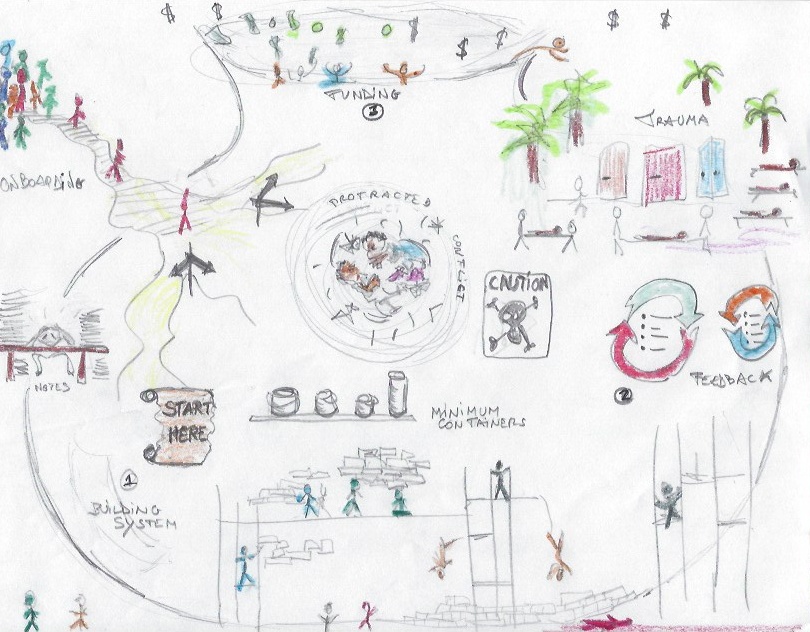Women Empowerment: A Long Way to Go
Women Empowerment and Gender Equality is still a distant dream for women in many parts of the world.

Understanding is a matter of perspective. While immersed in a socio-economic system that dominates all parts of our lives, imagining that anything else could replace it seems hard to do. Yet history has shown that nothing lasts forever and even the most powerful of empires rise, peak and eventually shift into decline. In her description of this phenomenon, Deborah Frieze explains that the collapse of a dominant system happens when emerging alternatives connect and begin to catalyze at scale, a social disengagement from the old system large enough to weaken its structure and lead to its demise [1].
Corporations driven by boundless growth overrun the regenerative capacity of the ecosystems within which they exist, leaving behind ecological and social nightmares. Movement Generation defines an ecosystem (home + together) as including "all the relationships within a home, from microorganisms, plants, animals and people to water, soil and air as well as the terrain and the climate. An ecosystem is not simply a catalog of all the things that exist in a place; it more importantly references a set of complex relationships.” So, the impact of the extractive system is being felt across many communities.
Now imagine instead that within those boundaries, things existed in balance with each other, held by systems that center care for home, where no one takes more than what they need and needs more they can take.
The process of walking in that direction, looks differently for different places and there are multiple entry points as well. Starting a process of democratizing, decentralizing and diversifying economic and social activities, while we damper down consumption and realign the distribution of resources and power, can be done in small local increments or at scale [2]. At the organizational level it already exists under the name "cooperatives" [3]. Now imagine cooperatives learning to cooperate with each other and innovating within a defined space.
Temporary containers still partially attached to patriarchal practices incubate burgeoning regenerative ecosystems.
The people inside the eco-system shift their labor to building systems whose purpose it is to repair ecological and social harms, open the flow resources towards where they are needed, remove barriers to participation, nurture the seeds of liberation and provide hospice care for those dying from the mismanagement of our planet [4].
Seeding alternatives that provide for everyone's needs is a daunting task. To converge resource flow and well-being, in theory, could be done like this [5]:
The act itself of putting our labor in service of restoring social and ecological balance helps create new structures which supports the emergence of new socio-economic systems when intentionally built around values that are local, regenerative, equitable and consensual. The shift in actionable values is what makes it a systems shift.
Tribal wisdom speaks of several conditions needed to make our work ethical and ecologically regenerative [6]: (1) a reciprocal relationship with mother earth, our model of regenerative generosity. Maintaining good relations with each other and our environment is an end in and of itself; (2) communities which value care-work; (3) a sense of enoughness where people acquire only what is useful and trade their surplus with others who may be in need; and (4) building trusting relationships rooted in care and transparency that is based on the disclosure not just of what is, but especially about potential pitfalls that the other should be aware of.
Wellness, which in the West is linked to comfort, is now measured by the quality of our relationships.
Theorizers are now seeking each other out in the spirit of learning from one another and advancing the capacity of the movement. They are motivated by a shared commitment to a field of practice aimed at shifting our current world order towards restoring ecological balance and social well-being on our planet. However, one, out of the many challenges to scaling these connections is that many of those experimenting outside the dominant system do not yet recognize each other.
Nascent pods of liberation often institute protection strategies rooted in separation during stages of incubation and to a lesser degree in more mature communities, often for the sake of self-preservation. The amount of trauma triggered by new arrivals transitioning out of patriarchal conditioning and the intensity of the work needed to reach internal alignment work as barriers to open borders between these spaces.
Without embedded systems for navigating transitions and pluralism in thinking and doing within the bounds of collective care, communities risk homogenizing themselves and thus remaining isolated from each other, each thinking they are the one with the antidote to capitalism. Continuously re-aligning one's work in service to the 'other' can perhaps help sustain trust and openness to the outside world, readying communities for the inevitable waves of migrations we will experience.
The emergence of a new socio-economic system will see work organized through democratic and voluntary cooperation and in service to the restoration of our habitat and each other, able to problem-solve tangible gaps, and meet the needs of everyone inside the ecosystem [7]. The process will create an enabling environment to both liberate the soil from the physical concrete that paves over life and liberate our spirits from the cognitive concrete that has paved over our imaginations.
----
[1] Deborah Frieze, "Two Loops, Networking for Community Resilience." Greenhouse Dublin Ireland (22 November 2011)
[2] Ibid.
[3] The International Cooperative Alliance defines 'cooperatives' as people-centered enterprises jointly owned and democratically controlled by and for their members to realize their common socio-economic needs and aspirations
[4] Deborah Frieze, "Two Loops, Networking for Community Resilience." Greenhouse Dublin Ireland (22 November 2011)
[5] Miki Kashtan. "Why Capitalism Must Go (six clips)" (accessed on Aug 23, 2021)
[6] Daniel Funds. "Tribal Wisdom for Business Ethics: Introduction." Ethics Initiative, New Mexico State University, College of Business.
[7] Movement Generation (MG). In "From Banks and Tanks to Cooperation and Care"
